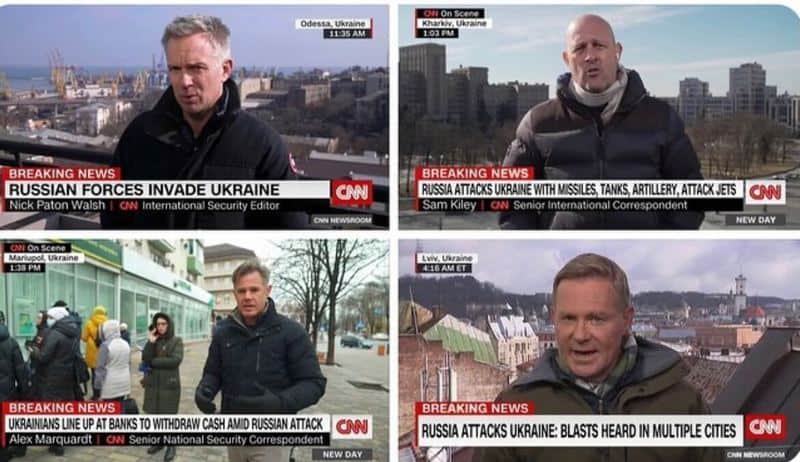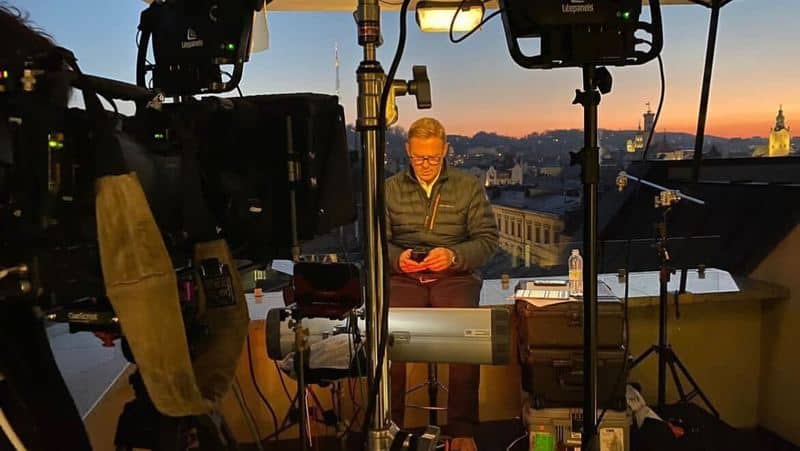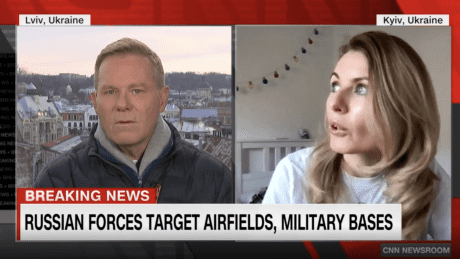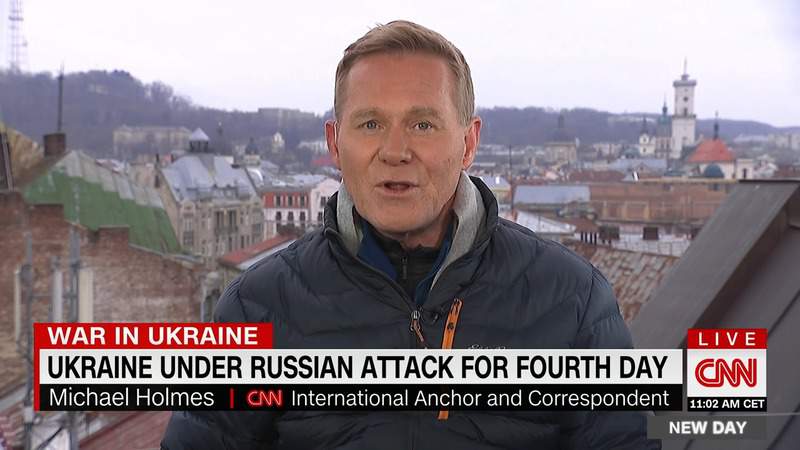CNN anchor and correspondent Michael Holmes is usually based in Atlanta presenting the news of the day on the global channel. He’s no stranger to field trips into combat zones though and the latest sees him posted to Lviv in Ukraine.
Holmes is currently presenting early evening Australia time, early morning in Ukraine, from a Lviv rooftop where he is rugged up against the cold.
He told Mediaweek on Friday that after finishing one day’s on-air duties it’s time to start prepping for the string of interviews with CNN reports and contributors for the next day.
“I’ve never continually hosted so many hours on continuous days ever. My cameraman started adding up and by the end of week three [Sunday] we will have anchored 100 hours in 20 days.” Holmes gets a break for about 8-12 minutes each hour when a CNN anchor elsewhere takes over briefly before he starts the next hour.

CNN correspondents cover the conflict in Ukraine
The Lviv rooftop is very different to the Atlanta studio facilities, but the Perth born former Nine News reporter said he’s spent enough time in the field to be used to what’s available. “The good thing is CNN has the resources to cover something like this very well. We must have around 30 people in Ukraine and on the borders. In Lviv alone, we have five engineers who are just doing the technical stuff.
“On the roof we have two cameras, a full light kit, a prompter, and crucially two heaters because it can be bloody cold.”
At 6am in Lviv, when Michael Homes is first on-camera each day doing a hit with CNN’s Don Lemon, he noted it hadn’t been above freezing for other than two days. “One morning it was -8. We’ve also had a few days with a couple of inches of snow. We’ve been lucky to have had no torrential downpours to deal with.”
Holmes juggles lots of guests across each day’s duties. Many back-to-back when news breaks. “I get wonderful support from the global CNN booking department who provide a schedule with most of the guests for the following day. I’m off air around midday locally so I then spend the afternoon preparing for the next round of interviews.”
The guest lists changes of course as the invasion takes different turns.
“A good interview doesn’t happen by accident. I’m not that good! I spend hours preparing for them, researching to make sure I ask questions that will be helpful and informative for the viewers.”
Holmes tries to be in bed about 8pm, ahead of his alarm at 3am.
Although the conflict is going longer than some initially forecast, Holmes said he has entered battle zones enough times to know that he might be in for a lengthy stay.
“When I was going to Baghdad twice a year for close to a decade, each visit might involve a stay of 4-7 weeks, depending on what was going on.”
CNN anchors have managed to come and go from different locations in Ukraine. Erin Burnett was reporting from inside the country, but more recently returned to the US, while Anderson Cooper arrived a few days into the invasion.
Holmes: “There are no flights here anymore of course, so people come in through Poland or Hungary and then drive in. Lviv is close to the Polish border and it’s not that hard to make the trip.
“Lviv is still considered safe, and it is a lot riskier for our teams in Kyiv. I’m sure the Russians will get to Lviv eventually, but they are a bit busy elsewhere at the moment.”

Michael Holmes on the Lviv rooftop
CNN has different evacuation plans for various scenarios. “As always, CNN is well staffed with professional security who are mostly ex-military and they know what they are doing. Every team everywhere has a plan. I have always felt very comfortable about the investment CNN puts into its plans for looking after teams in the field.”
Lviv is the base for many reporters because of its ease of access to the west and its relative safety. Holmes explained: “I have bumped into a few people I know including an old friend now at Al Jazeera, a Dutch TV crew recently came to see me, and I met another friend now with German TV. I’ve also crossed paths with friends from Sky, including a former producer, who were here.”
Although Lviv is safer than some of the other Ukrainian cities, Holmes and his colleagues are cognisant that mortars and artillery fire can happen when most unexpected. “That is not happening here yet I hasten to add.”
Some of the videos CNN has been sharing recently have carried warnings about graphic content as the invasion escalates. “Putin has form in brutal tactics, especially when things are not going well and he will be more dangerous,” cautioned Holmes.
“People who remember what Russia did in Grozny, Chechnya and Aleppo in Syria. If that happens here the damage and loss of life will be incomprehensible. If Putin decides to pummel Kyiv it will get very ugly, very quickly.”

As to letting Ukraine fight the war without NATO involvement, Holmes doesn’t expect that to change. “If NATO enters in a physical sense then you are starting a European war. If you try and have a no-fly zone you better be ready to shoot Russian planes down. As soon as that happens you have World War 3.”
The Ukraine invasion is attracting comparisons to some of the horrors of World War 2. Holmes noted part of that perception is because the traditional media and citizens with their own cameras are sharing the conflict live with the rest of the world: “There have been a lot of bloody wars in recent times. I went to Iraq 17 times and can attest to that. Places like Syria and Afghanistan have cost more lives and been more bloody, but this one is very visible.
“And perhaps it is getting more attention because it is in Europe and there is a risk it could spread outside the borders of Ukraine.”
Holmes noted he interviewed the President of Lithuania this week who was concerned about what happens in the region if Ukraine falls to the Russians.
Watch CNN in Australia on Foxtel and Flash.
See also: Anchor Michael Holmes on the night CNN was stormed
